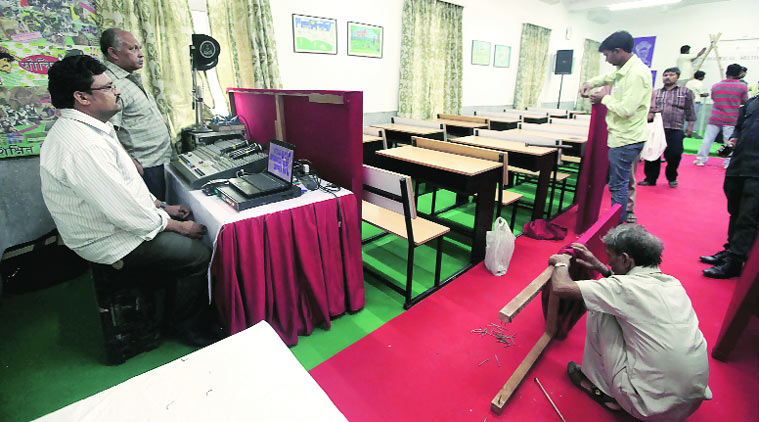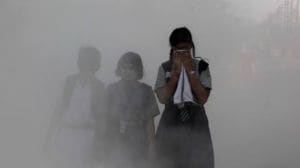Stay updated with the latest - Click here to follow us on Instagram
Class of 2015: Awards for the best teachers
Instituted in 1958, the National Award to Teachers are given away by the President of India on September 5 to honour teachers for their unwavering campaign for education in the country.
 The President’s Estate School prepares for the visit of President Pranab Mukherjee on Teachers’ Day. (Source: Express photo by Renuka Puri)
The President’s Estate School prepares for the visit of President Pranab Mukherjee on Teachers’ Day. (Source: Express photo by Renuka Puri)
Instituted in 1958, the National Award to Teachers are given away by the President of India on September 5 to honour teachers for their unwavering campaign for education in the country. The Indian Express met some of the teachers to be honoured this year.
Lighting the path for kids
Name: Nagappa R Shirod
School: Government High School, Siddalinga Nagar, Gadag, Karnataka
Teaches: Music (Carnatic and Hindustani)
Number of years teaching: 21
Their story: Born blind, Nagapppa was abandoned by his parents when he was just a few months old. At just six months old, he was taken in and nurtured by late renowned musician Puttaraj Gawai – a Padma Bhushan awardee. In the Veereshwara Punyasharam, a music school for the differently abled started by Gawai, he received his training in music. The love for the art form made him decide that he wanted to teach music to school children.
The one change they would bring to India’s education system: “Music and other extra-curricular activities need to be encouraged more which they are not. Music is not just a vocation; it helps in the overall mental growth of children and makes them more peaceful and happy. My hope is that one day every school and college in the country will have musical instruments.”
A madrassa with a twist
Name: Nurul Islam Mia
School: Beldanga Darul Hadeeth Senior Madrassa, Beldanga, Murshidabad, West Bengal
Teaches: Arabic. Is also Headmaster.
Number of years teaching: 22
Their story: In Belgaum, Mia’s story is well known not only because he is a headmaster at the madrassa, but the man who brought arsenic free water to the area. “With my students, we thought of a solution to the problem of arsenic poisoning. By spending our own money and working with the administration, we connected pipes with the water treatment plant on the banks of the Ganga nearby to bring clean water to our parts. We also started a students relief fund in our madrassa, where anyone who has an illness can get their treatment subsidised by 75 per cent.” These initiatives have gone a long way to dispel the notion, at least in Beldanga, that the madrassa teaches only religious education.
“We teach Arabic yes, but it is only an addition to the normal subjects which are according to the West Bengal Board. We also approach our religious teaching as theological research,” he said.
The one change: “The first thing I would do was to increase tax purely to increase the funds available for poor students across the country. We often here that there are no funds at the district level for education and that has to change, even if all education is provided free of cost in government institutions. The rich can have more money, but the poor must have the same rights.”
Fighting drugs in class
Name: Makhan Singh
School: Middle School, Talwandi Akria, Mansa, Punjab
Teaches: Art and Crafts, Punjabi
Number of years teaching: 22
Their story: Teaching in a school in a small, entirely agrarian village in Punjab, Makhan Singh is very proud of his academic record. “In all the years that I have been teaching, every single student, except one, several years ago, has got a first division. I remember him very clearly though,” he smiles almost ruefully. But for Singh, academic success isn’t the only challenge. “I have the phone numbers of every student that enrolls in my class, and if they don’t attend I call their parents. It is essential they come to school,” he said. His worry stems from a concern in rural Punjab over students turning to drugs. “There are no narcotics in middle school where I teach Classes VI, VII and VIII. But we have to root it out now. So I organise anything that will raise awareness ranging from anti-tobacco campaigns, anti-narcotics painting competitions and weekly debate competitions,” he said.
The one change: “It’s very simple. Every child has to come to school. The government has to make sure that every student attends, only then can we bring awareness about issues like drugs. There are schemes that the government has put into place, but if they don’t ensure that everyone comes to school, how do we implement anything?”
Principal, chief recruiter
Name: Uday Raj Yadav
School: Purva Madhyamik Vidyalaya, Maharajganj, Aligrah, Uttar Pradesh
Teaches: Hindi, Sanskrit, English. Is also the Headmaster.
Number of years teaching: 32
Their story: With the school he is now the headmaster of in a poor village in Azamgarh, the biggest challenge has been to pull children into school, where for most families, every working hand counts. In admission season, he says, he goes around with a group of six teachers for a week, telling students to come to school. “Last year, from four villages where we went house-to-house, we got 90 admissions. A majority of them were girls. But often, we arrange uniforms, because in the cold, they can’t afford sweaters. The results have been good. Many of our students have become government students. The challenges of our schools are entirely different from the ones in Delhi. Often I have to sweep the floors. Simply because there is nobody else,” he said.
The one change: “This may be hard to accomplish, but what our education system needs the most is equality. While the rich sit on furniture, the poor in my school sit on straw mats on the ground. Whatever the cost, I would concentrate on infrastructure in existing government schools across the country. It is only equal and good education that can change the fate of our youth in the country.”
Battling girl dropouts
Name: Lukhimai Rani
School: Ri-Bhoi Presbyterian Senior Secondary School, Nongpoh, Ri-Bhoi, Meghalaya
Teaches: Social Science, Social Welfare, Health Education
Number of years teaching: 27
Their story: A mother of five, Rani was always interested in inculcating value education. Despite her husband’s accident a few years ago which restricted his movement, Rani continued to work not just in her school, but also outside of it helping deaf and blind students. Since her school is located in a rural area, she says there is high dropout rate. “For girls, it’s especially sad because many of them are married young at the age of 14 or 15. One day they’re in class, and the next day when we find out they’ve been married.”
The one change: “In rural areas, there are many students who’re not interested in and good at conventional subjects, but do well in sports like football and basketball or even handicrafts. Education needs to go beyond the chalk and board model.”
A 100% pass record
Name: Archana
School: Hathog Government Senior Secondary Sanskrit School, Jaipur, Rajasthan
Teaches: Biology
Number of years teaching: 21
Their story: Earlier teaching just Class X and XII, Archana has now been given charge of also teaching Classes IX, X and XI in Hathog — her new school. She says the additional charge was given by a lack of teachers which itself shows the state of education. She has more girls than boys in her class but doesn’t think that’s necessarily a positive thing. “Parents think girls are ‘paraya dhan’ so why should we spend on them and their education. They therefore send them to government schools, boys usually go to the private ones,” she says. For the last 15 years, Archana has a 100% pass record — no student of hers has failed, she claims.
The one change: “There are a few things that need to change. One, there should be much more emphasis on practical knowledge and also visual knowledge. Children learn much better when they see. Even the alphabets should be taught like that. M for Mobile will make more sense when you show them a mobile.”
A journalist, a teacher
Name: Sanjay Ramdas Sonawane
School: Mahatma Gandhi Shikshan Mandal Sanchalit Madhyamik School, Jalgaon, Maharashtra
Teaches: Maths and Science
Number of years teaching: 19
Their story: Sonawane is not just a teacher but also a reporter for Lokmat. Before and after school hours, he reports thereby gathering knowledge of state and central government schemes. This knowledge is then used to help several people in making maximum use of schemes meant for them.
The one change: “The system of not failing students before Class IX has to go. We have seen that many students who are promoted like this do not have their basic concepts clear. Also, an appropriate student teacher ration needs to be maintained.”
Social service came first
Name: Abdul Rashid
School: DY Bhartesh High School, Belgaum, Karnataka.
Teaches: Social Studies, Kannada
Number of years teaching: 35
Their story: With eleven months to go before he retires, the last decade has seen Rashid move to Belgaum. But he is most proud of his work in the villages on the outskirts of the city. Early in the 1980s, Rashid was posted at MK Patil High School, Baswanjurchi, a school that was run out of a community centre. “The first challenge was to bring farmer’s children to school, and for that I had to win the parents’ confidence. So I became a conduit between them and essential services. So I made a list of widows and made sure the benefits the government gave reached them. Once gained their confidence, I went to the children at night, when they were free from the fields, and spoke to them about the benefits of education,” he said.
The one change: “Its is very clear that the education standards are failing because of the new norm that prevents teachers from failing students. It has broken our system of discipline as the students know they will inevitably pass. And in an atmosphere where when they reach senior classes, like the SSC exams in Class X, when a good result is essential, it makes the situation impossible.”
Education and theatrics
Name: Nimbappa Solagi
School: Government Higher Primary School Kote Mundargi, Gadag, Karanataka
Teaches: Theatre, Kannada, History and other activities
Number of years teaching: 25
Their story: Despite holding a PhD in children’s theatre, Mundargi decided to work in schools and not teach in colleges as he says children are his first love. In the last 25 years, he’s dedicated himself to nurturing the cultural values of children through various extra-cultural activities including debates, poetry and, of course, theatre.
The one change: “Children need to be taught how to learn rather than how much to learn. Individual talents need to be recognised and students should be encouraged to follow them instead of conventional subjects.”







